Letter from Richard Rush to James Brobson

Richard Rush writes to Delaware politician James Brobson regarding a case of the estate of John Dauphin.


Richard Rush writes to Delaware politician James Brobson regarding a case of the estate of John Dauphin.

US Treasury Comptroller Richard Rush writes to David Gelston requesting "a statement in the case of Abraham S. Hallet, who claims debentures for a quantity of merchandize [sic] shipped by him."
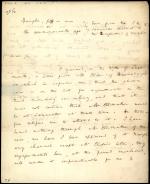
Pennsylvania Attorney General Richard Rush writes to William Jenkins about the case of Spangler v. the Commonwealth. As Rush could not attend, he asks Jenkins to "conduct the argument upon the part of the commonwealth" on his behalf.

Richard Rush writes to Secretary of the Navy William Jones and recommends Horatio Stockton, son of New Jersey congressman Richard Stockton, for consideration for a position as a midshipman in the United States Navy.
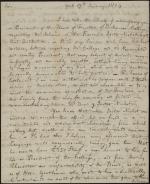
Ralph Bowie writes to John Montgomery, the President of the Board of Trustees of Dickinson College, in an attempt to settle Dr. Charles Nisbet's claims against the College. Transcript included.

Charles Nisbet writes bookseller William Young to discuss various political and religious events in France, Ireland, and the United States.
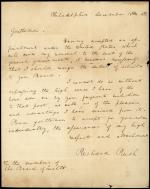
Pennsylvania Attorney General Richard Rush writes to the members of an unspecified "Board of Health," stating his resignation as solicitor.
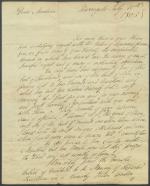
Charles Keith writes to Anne Nisbet regarding the death of her husband. "One of the best of Men is forever lost to his Friends and Mankind," as Keith observes. Keith also explains his decision to write Monody to the Memory of the Rev.

Richard Rush writes to an unspecified "M. Carey." Rush desires to "cultivate... correspondence," although he will be busy for several months due to obligations with Congress and the Supreme Court.

Acting Secretary of State Richard Rush writes to Jonathan Russell, the United States minister to Sweden and Norway, regarding "the claims of several citizens of the U.


John Wilson agrees in this memorandum to release his medical practice to Seith Cattell for $600 per year.

This legal document serves notice that Benjamin Rush has filed the necessary documents in Philadelphia to serve as the administrator of Dr. John Hall’s Estate.

Dr. Benjamin Rush writes to James Orbison, the executor for the estate of William Thompson, and asks that Orbison pay an outstanding bill for medical expenses.

Dr. Benjamin Rush writes to Dr. Ashbel Green about Dr. Muhlenberg's visit as well as the possibility of working with Robert Ralston. "I expect to see [Dr.

Benjamin Rush writes to an unidentified doctor and thanks him for his long letter as well as the enclosed newspaper clippings.

Attorney Samuel Duncan sends this printed legal notice to Charles Nisbet, informing Nisbet that the house and lot he occupies are the property of John and Richard Penn.

Charles Nisbet writes to his son Alexander, an attorney in Baltimore, MD. Nisbet discusses Alexander's recovery from influenza, problems facing universities and colleges, and the health of his family. Transcript included.

Charles Nisbet writes to his son Alexander, an attorney in Baltimore, and offers advice on various topics. "Taverns," as Charles explains, are "the slaughter-houses of the most part of the youth of this country" and should be avoided.

Joseph Priestley sends instructions for printing his manuscript (Index to the Bible) and orders several copies of his Church History and Lectures. Priestley also tells John Vaughan that he is out of oysters.

Joseph Priestley offers the Rev. Mr. Kell a horse for him to ride to Cradley. Priestley also includes 7 lines of text written in Annet's Shorthand.
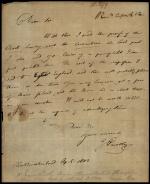
Joseph Priestley writes to Matthew Carey with proof of the Chart and corrections to Priestley's pamphlet Church History. Priestley also asks that the pamphlets are not advertised immediately. Transcript included.
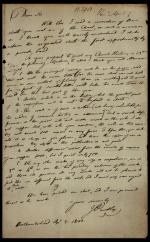
Joseph Priestley writes to Matthew Carey, sending corrections for a draft of his book Church History.
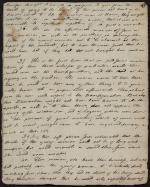
This manuscript page is from an early draft of Joseph Priestley's Notes on All the Books of Scripture.

Joseph Priestley writes to Rev. John Evans in London, thanking him for his "valuable book." Priestley sends a tract on baptism in return. Transcript included.